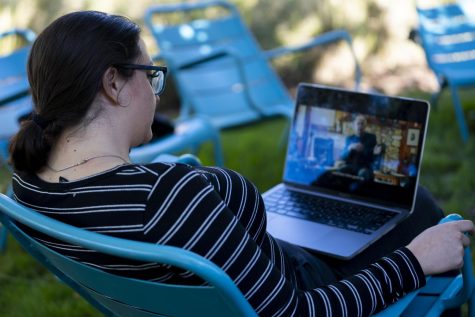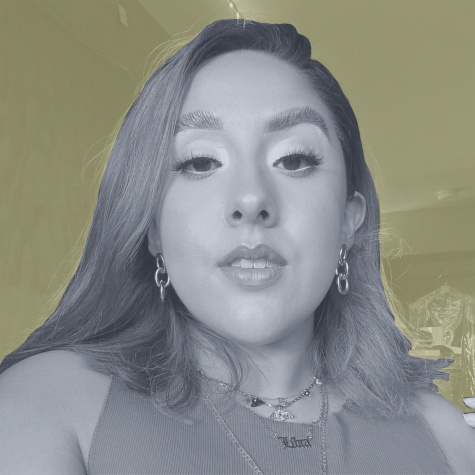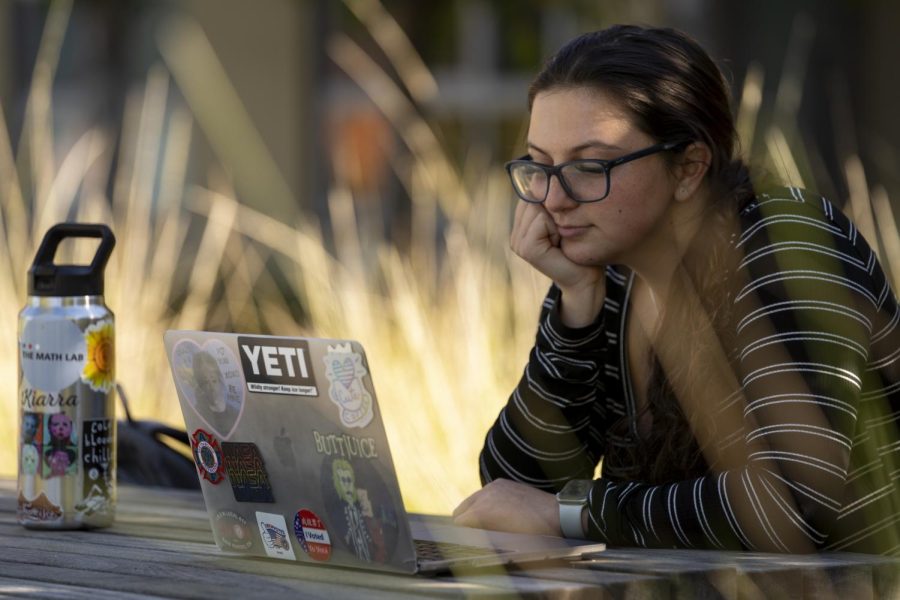A Morbid Curiosity: Why Do We Love True Crime?
Kiarra Dolan watches a show on her laptop outside of her work in San Mateo, Calif., on Nov. 11, 2021. Dolan is a student at California State University East Bay who enjoys true crime mysteries in her downtime. (Nicolas Cholula / Xpress Magazine)
Mary Mayone puts her headphones on and turns to her bedside table to turn off the light. She lays her head against her pillow, picks up her phone and presses play. The story of a gruesome murder plays through her headphones in the form of a podcast as she drifts to a peaceful sleep.
Some people turn to true crime as a form of comfort and relaxation, just like Mayone. They will listen to these crime stories at any time of the day, whether it’s to help them fall asleep, during a long drive or while doing homework. True crime podcasts can give people a sense of comfort, similar to that of ASMR (autonomous sensory meridian response), where videos are made to stimulate the mind in the form of audio sounds.
But why do people turn to the retelling of violent and morbid crimes?
Mayone, 23, just graduated from San Diego State University and currently lives in Monterey. She listens to her favorite podcast, Morbid, more than she listens to music. Morbid is a true crime podcast that focuses on different cases in each episode. She laughs as she mentions how almost every time she picks up a friend, they open her car door to the sound of this podcast blaring out of the speakers.
“I really am so embarrassed, I don’t even listen to music anymore,” says Mayone. “I always tell my friends, ‘You can put something on, I’m sorry.’”
Kiarra Dolan, a 21-year-old student at California State University East Bay, is an avid true crime fan and laughs at her morbid yet fascinating hobby. She enjoys how these podcasts break up information in cases and present the most important parts, making it easier to digest. Her favorite podcast is also Morbid.
“I’m obsessed. I feel like it’s kind of weird,” says Dolan. “Now it’s a little bit more socially acceptable. I feel like a lot of people have a true crime addiction.”
Looking up the term “true crime” on Spotify, hundreds of results pop up. On Netflix, they have several categories for true crime such as Dark True Crime Documentaries and Biological True Crime Documentaries. The results of true crime media seem endless.
The first popularized case of true crime was a serial killer known as the Jack the Ripper. His crimes started in 1888 on the East End of London. He killed and mutilated five women, all of the lower class. This case took over not only England but the entire world. It covered the newspapers all over the world and continues to captivate people even to this day.
“In the era of the invention of the newspaper, when that was a lot more important than it is today, in terms of mobilizing public opinion, we know that things like letters to the police, and media coverage of that goes back at least to the Jack the Ripper murders in London,” says Jonathan Simon, a legal studies professor at the University of California Berkeley.
People were outraged by Jack the Ripper’s heinous crimes, and the police received an influx of letters from concerned citizens. When asked about the progression of true crime, Simon immediately compared how the Jack the Ripper case was covered versus how cases are covered today.
Committing crimes is not a common occurrence for most people, so listening to stories of people committing them can be fascinating. It can give people comfort in the fact that they are not enduring these heinous crimes.
This is something that Jeffrey Snipes, a criminal justice professor at San Francisco State University, hypothesizes. He talks about how a love for true crime can stem from wanting to help with these cases and gives people this feeling of suspense and thrill.
“We like to be scared, it’s like watching a horror movie from the comfort of your own living room,” says Snipes.
Mayone mentions how she likes true crime because it feels more like a “controlled scare.” She gets to control when she gets a “jump scare” and she knows what happens at the end of the story. She calls it a “controlled anxiety,” something she is able to find comfort in.
Dolan wonders about the origins of her “obsession” with true crime. Some of her favorite true crime cases are that of serial killers like Ted Bundy or the disappearance of Amanda Berry, who was held captive for 10 years along with two other girls before escaping. Dolan thinks she enjoys true crime so much because of her fascination with the idea that someone can commit these crimes.
“It’s just totally crazy to me to imagine people having the capacity to be so evil,” says Dolan.

She has even gone as far as reading through pages of court transcripts, such as the transcripts of Ted Bundy’s 1984 case. There are hundreds of pages of documents connected to this case, and Dolan has read them all. Dolan enjoys coming up with her own hypothesis on unsolved cases, almost like a puzzle.
The Zodiac Killer, one of the most popular unsolved true crime cases, has dozens of podcast episodes on the case and even a live-action movie, “Zodiac,” made in 2007 starring Jake Gyllenhaal. This serial killer killed at least five people in California, but it is rumored to be many more. Two of these murders occurred in the Bay Area.
Recently, a group known as the Case Breakers, with over 40 members of retired FBI agents and forensics experts, came out with a new potential suspect for the Zodiac, Gary F. Poste who died in 2018. This case is still unsolved and holds an immense amount of history and interest in it.
Paul Drexler is a 73-year-old crime historian that focuses on the San Francisco Bay Area. He is the director of the Crooks Tour of San Francisco, a walking tour through San Francisco’s most famous and notorious crimes. He has also written several columns at the San Francisco Examiner about the Zodiac Killer.
Drexler recounts how Tom Colbert, a Hollywood producer working with Case Breakers, called him on the morning of September 26, 2021. Colbert spoke to Drexler about the theory that Poste could potentially be the Zodiac and Drexler pondered its validity.
Drexler refers to a community that has been built around the case of the Zodiac Killer, almost religion-like.
“‘Zodiology’ is the study of the Zodiac crimes. It’s all over the world, it’s like there’s a number of different religious sects, each with their own candidate. And I do notice there’s a certain kind of tunnel vision that comes across people who seriously tried to solve this,” says Drexler.
The motivation for starting a true crime podcast can vary from an intense hobby, to a real criminal justice background or even to a personal connection. For Angel Lee Turner and her producer Maria Martin, the start of their podcast They Called Her Georgia Lee started with a drive for people to understand her sister Georgia Leah Moses’ case and, most importantly, who her sister was as a person. They have about 2,500 active listeners per episode and have had almost 27,000 downloads since they started in July 2021.
Turner and her sister were born in Buffalo, New York, and later moved to Sonoma County, California. Moses lost her life in August of 1997 at the age of 12 in Santa Rosa, California. The police ruled that she died of strangulation. It was later called a cold case.
Moses was a role model to Turner — someone Turner saw as her guardian angel, hero and big sister. Turner was seven years old when she lost that role model.
“She was a natural leader. I always joke and say, you know, because she practically raised me and when I look back over my childhood, she was my mom. She was the one that taught me how to swim, she taught me how to tie my shoes,” says Turner. “She was really instrumental in making sure that my childhood was to a certain standard.”
Turner hopes that her podcast reaches people. Tuner believes that if no one is paying attention to a case, like her sister’s, it will not gain the traction it needs to be solved.

Ximena Loeza (she/they) is a 22-year-old Bay Area native. She enjoys writing about beauty, fashion, social justice, queer culture, and all things pop culture.


